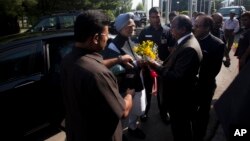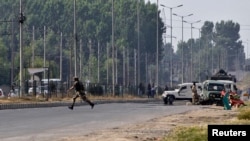NEW DELHI —
Indian Prime Minister Manmohan Singh says the country stands united in the fight against terrorism. His comments during a rare visit to Indian Kashmir came a day after a deadly attack in India’s only Muslim majority region killed eight soldiers and wounded 13 others. Separatist groups called for a general strike to coincide with the prime minister’s visit.
Laying the foundation stone of a hydro-electric power project in Kishtwar in Indian Kashmir Tuesday, Prime Minister Manmohan Singh stressed the need for constant vigilance against terrorism.
Singh arrived in Kashmir the morning after militants mounted a daring attack on an army convoy on the outskirts of Srinagar, killing and wounding soldiers who were deployed ahead of the high-profile visit. It was the bloodiest militant strike in the restive region in the last five years, and came two days after another attack killed two policemen.
Prime Minister Singh said the militant attack will not deter efforts to bring peace to the region.
Paying tribute to the soldiers who died, Singh said the entire country is united to fight terror. He said terrorists will never succeed in their aim.
The Indian prime minister pointed out that terrorist-linked violence in Kashmir has declined sharply and was the lowest in the last two decades in 2012.
A Muslim separatist insurgency raged during the 1990’s in the Himalayan region. But there has been relative calm in recent years. However, tensions have spiked in recent months in the wake of the hanging of a Kashmiri man for his role in an attack on the Indian parliament in 2001.
Those tensions were evident during the prime minister’s rare visit to Kashmir. A call for a boycott of Singh’s visit by three Kashmiri separatist groups shut down shops, businesses, schools and colleges in Srinagar. A top separatist leader in the state, Syed Ali Shah Geelani, said the strike was called to remind the world that “Kashmir is a dispute, pending a resolution.”
Kashmir is divided between India and Pakistan and claimed by both.
On Wednesday, the prime minister is scheduled to inaugurate a rail tunnel that will eventually connect Kashmir to the Indian rail network. It will vastly improve transport links of the remote Himalayan region to the rest of the country.
Singh is accompanied by the powerful head of the ruling Congress Party, Sonia Gandhi.
Gandhi said efforts are under way to build roads in remote rural regions. She said this, along with the rail link, will help bring development to the area.
Indian leaders hope that development will help bring economic benefits to the remote region and reduce the influence of Muslim militants who led the separatist insurgency.
However, anti-India sentiment is still visible in the region. In 2010, it was the scene of mass popular pro-independence protests.
Laying the foundation stone of a hydro-electric power project in Kishtwar in Indian Kashmir Tuesday, Prime Minister Manmohan Singh stressed the need for constant vigilance against terrorism.
Singh arrived in Kashmir the morning after militants mounted a daring attack on an army convoy on the outskirts of Srinagar, killing and wounding soldiers who were deployed ahead of the high-profile visit. It was the bloodiest militant strike in the restive region in the last five years, and came two days after another attack killed two policemen.
Prime Minister Singh said the militant attack will not deter efforts to bring peace to the region.
Paying tribute to the soldiers who died, Singh said the entire country is united to fight terror. He said terrorists will never succeed in their aim.
The Indian prime minister pointed out that terrorist-linked violence in Kashmir has declined sharply and was the lowest in the last two decades in 2012.
A Muslim separatist insurgency raged during the 1990’s in the Himalayan region. But there has been relative calm in recent years. However, tensions have spiked in recent months in the wake of the hanging of a Kashmiri man for his role in an attack on the Indian parliament in 2001.
Those tensions were evident during the prime minister’s rare visit to Kashmir. A call for a boycott of Singh’s visit by three Kashmiri separatist groups shut down shops, businesses, schools and colleges in Srinagar. A top separatist leader in the state, Syed Ali Shah Geelani, said the strike was called to remind the world that “Kashmir is a dispute, pending a resolution.”
Kashmir is divided between India and Pakistan and claimed by both.
On Wednesday, the prime minister is scheduled to inaugurate a rail tunnel that will eventually connect Kashmir to the Indian rail network. It will vastly improve transport links of the remote Himalayan region to the rest of the country.
Singh is accompanied by the powerful head of the ruling Congress Party, Sonia Gandhi.
Gandhi said efforts are under way to build roads in remote rural regions. She said this, along with the rail link, will help bring development to the area.
Indian leaders hope that development will help bring economic benefits to the remote region and reduce the influence of Muslim militants who led the separatist insurgency.
However, anti-India sentiment is still visible in the region. In 2010, it was the scene of mass popular pro-independence protests.





